This post is part of our special coverage Europe in Crisis
‘Blockupy‘ protests against “the widespread impoverishment and denial of democratic rights occurring in the Eurozone as part of a global systemic crisis” shook the financial epicenter of Europe – Frankfurt – last week.
Following the global action days on 12 and 15 May, 2012, (12M and 15M), activists from across Europe were called to converge in Frankfurt in an international solidarity demonstration. The ultimate goal was to blockade the European Central Bank (ECB) and other crucial global capitalism institutions. On May 4, however, the Frankfurt Municipal Department for Public Order announced that all actions planned were deemed illegal, except for a rally on Saturday, May 19.
Still, thousands of activists decided to take a stand against the ban and claim the constitutional right “of unarmed assembly, without either prior registration or permission”.
While international mainstream media didn't give much attention to the events, online social networks buzzed with citizen reports on the mobilizations that occurred under massive police presence and repression.
On Twitter many videos and photos were shared under the hashtag #Blockupy. Netizens and collectives from different countries, such as Occupy Brussels and Belgium, livestreamed the protests, marches and assemblies, as well as the cultural program and diverse debates on labor, ecology, economy among others.
“Demonstrate for the right to demonstrate”
Blockupy started on the same day that newly elected French President Hollande met Chancellor Merkel [fr] in Berlin, May 16. Meanwhile in Frankfurt, the police complied with the order of eviction of the seven month long Occupy Frankfurt settlement around the Euro sign near the ECB headquarters. The blog Critical Legal Thinking, which had a comprehensive coverage of the four days of protest, described the city as “effectively in [undeclared] State of Exception“.
On May 17, a bank holiday, as mainstream media directed the spotlight to the German Finance Minister Wolfgang Schäuble – who was awarded the Charlemagne Prize for his major role in the definition of the austerity policies mostly imposed on the periphery European countries – buses filled with activists from different cities heading to the anti-austerity demonstration in the center of Frankfurt, were stopped from entering the city and escorted back by the police.
Despite the attempts of intimidation, around 2,000 activists managed, at least for a few hours, to occupy the historic Roemerberg square where the city hall is based, and which represents the birth of democracy in Germany.
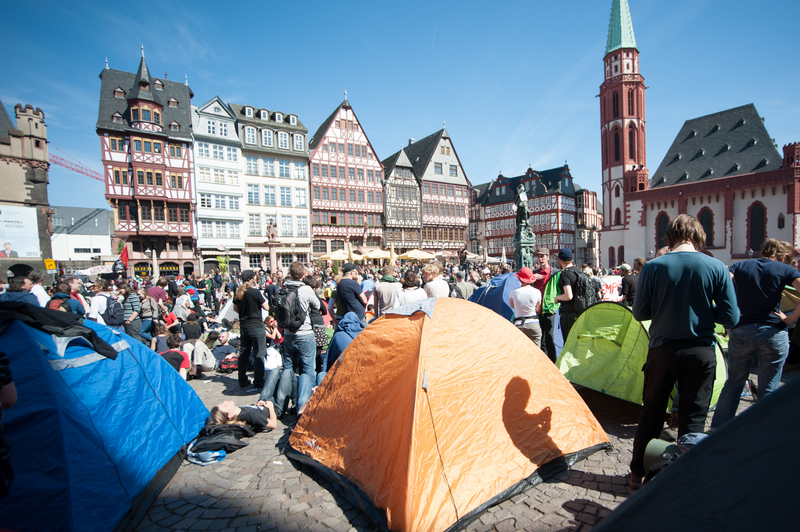
Blockupy protesters take action against banking and finance system. Photo by Patrick Gerhard Stoesser, copyright Demotix (May 17, 2012).
The square was soon surrounded by the riot police:
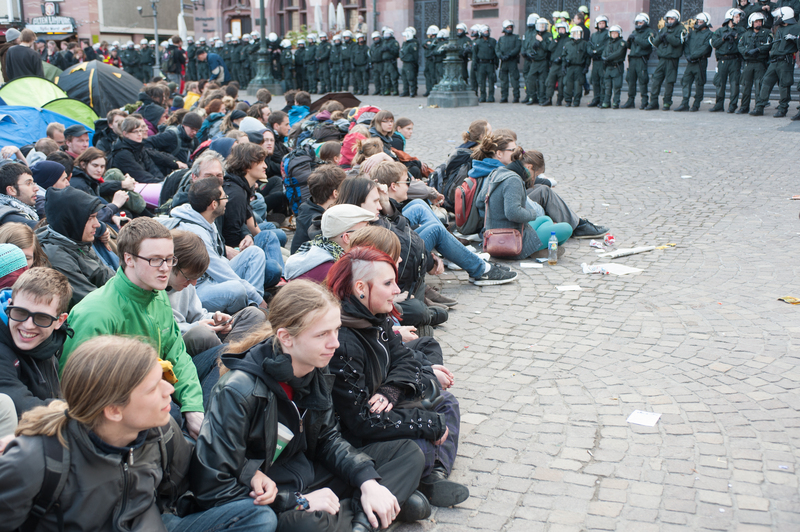
Protesters sit down and lock arms in opposition to police presence. Photo by Patrick Gerhard Soesser, copyright Demotix (May 17, 2012).
At the end of the day riot police evicted the square with violence, as different photo reporters [de] illustrated:

A protester is detained by police. Photo by Patrick Gerhard Stoesser, copyright Demotix (May 17, 2012).
The detention of at least 400 protesters of different nationalities triggered solidarity protests in different cities across Europe:
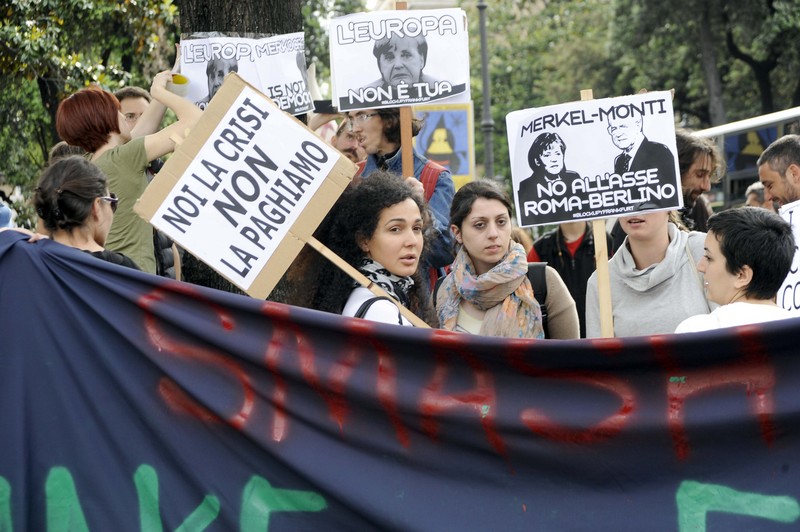
Embassy of Germany in Rome – Protest against repression and arrests in Frankfurt during the protests against the crisis. Signs against the Rome-Berlin axis, the ECB and Merkel. Photo by Simona Granati, copyright Demotix (May 18, 2012).
A video report by Finnish user of YouTube sydansalama1, with interviews subtitled in English, sums up the events of the day:
The staff of banks were told by their employees to take the day off or work from home to avoid having to come into the city on Friday, May 18 – the day when the blockade to the financial district was expected to take place. However, as Jerome Ross from Roar Magazine wrote the night before, “Frankfurt [is] on lock-down as over 5,000 police [are] deployed in an unprecedented operation to keep protesters out of the city and away from the banks”:
as the activists here prepare to physically block the headquarters of the European Central Bank, the police already seems to have done the job for them.
That day, international mainstream media reported on Goldman Sachs being hired by the Spanish government to evaluate banking conglomerate Bankia, taken over by the state earlier in May, and also about rumors of a referendum in Greece to ballot the membership in the Eurozone. In Frankfurt, while banners read messages of support to the European southern countries (such as “We are all Greeks“), the city remained “affected by massive police presence, identity checks and road blocks“.
When the legal day for protesting finally arrived, May 19, around 20,000 protesters (according to the police, or more than 25,000 according to the organization) rallied the city center.
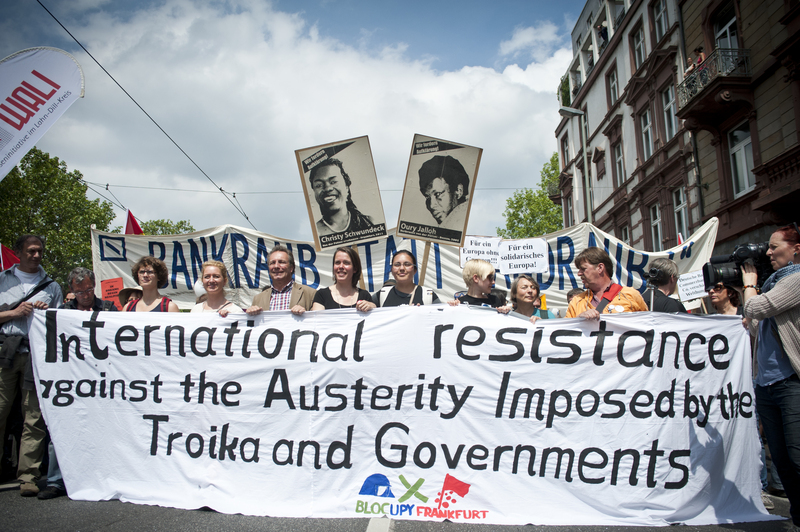
Blockupy Demonstration in Frankfurt. A large banner held up by protesters reads: 'International resistance against the Austerity Imposed by the Troika and Governments.'. Photo by Michele Lapini copyright Demotix (May 19, 2012).
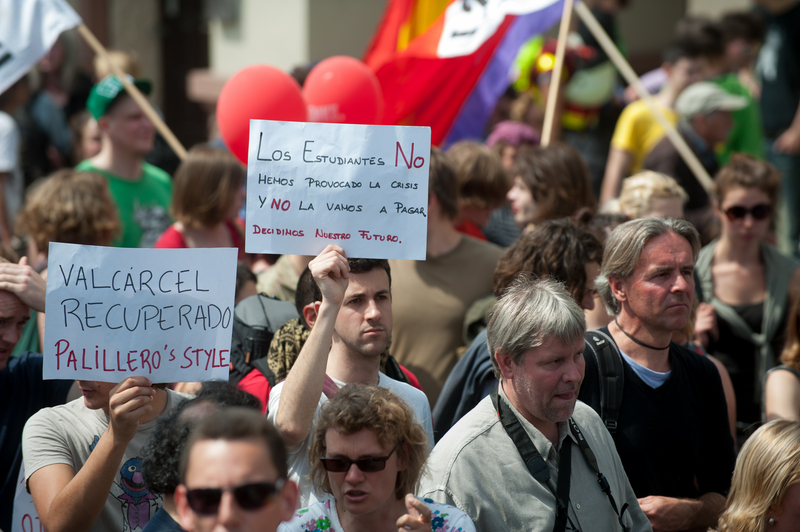
Blockupy Frankfurt: More than 20,000 against financial crisis politics. International participants in the demonstration. Photo by Patrick Gerhard Stoesser copyright Demotix (May 19, 2012).
John Halloway, writing for the Guardian, described Blockupy as “a glimmer of hope in times of austerity“, and argued that it would bring momentum to “explosions of creative anger that will follow”. International policy analyst Vinay Gupta, finalizes:
Those people in the streets rioting, the protesting classes, are fighting not for internal political change within their own countries, but (whether they know it or not) for a re-arrangement of the political balance of an entire continent.
This post is part of our special coverage Europe in Crisis.

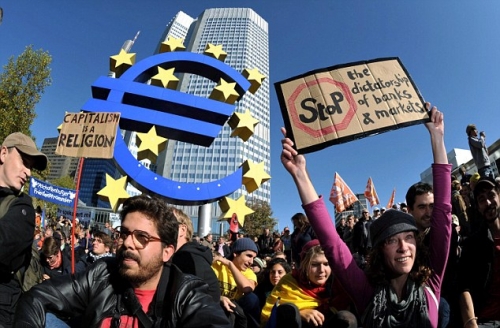

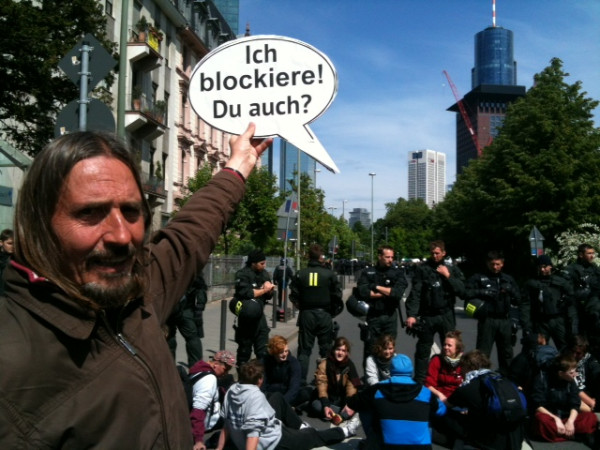
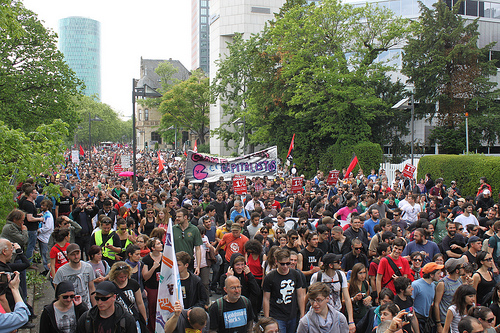






1 comment
I find it extremely dangerous to fall atrap of the anti-“austerity” narrative. The cuts are not about austerity, they are about weak financial market regulations and liberalisation and the fallout of it. Austerity is just the soft landing of that fallout. what really needs to be done is to forge an order for financial stability, not destablelise the order by further indebtment, inflation and so called “growth” policies. What is often overlooked is that the option of devaluation equally translates into financial losses for a society. We have now a system in Europe where some steering wheels are blind and we did agree on that system for a reasons, it is just plain moronic to advocate for bananan currency methods as the panacea.